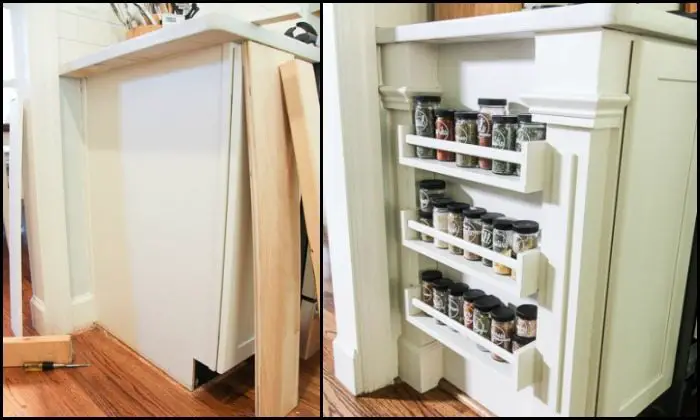If you enjoy cooking, then you know how important it is to be able to find that bottle of seasoning precisely when you need it. A built-in spice rack near your cooking space is the answer to this problem.
Have you been looking for a way to keep your spices in order? If so, then you’re going to enjoy this project.
Because here’s a spice rack idea that just might suit your kitchen. It’s space-saving, easy to build, and beautiful too!
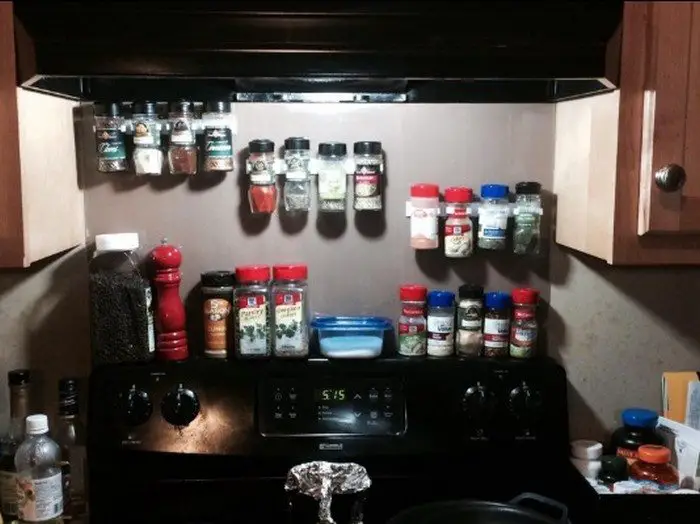
This DIY spice rack uses the dead space at the end of a counter which many kitchens usually have. If you don’t have a pantry or don’t want congested cabinets, you can do this idea for your spices instead.
This project is an Ikea hack that uses three Bekvam spice racks. They are made from solid wood and are pre-made, making the entire project even easier. Of course, if you have some nice pieces of wood in your storage, then you can DIY the spice racks yourself.
Is this going to be your next DIY kitchen project?
Contents
Building a Built-In Spice Rack
Transforming Ikea’s Bekvam spice racks into a sleek, built-in spice rack enhances kitchen organization and adds a custom touch to your culinary space. Follow this guide to create a built-in spice rack tailored to your kitchen’s aesthetic and functional needs.
Materials and Tools:
- Ikea Bekvam Spice Racks
- Sandpaper (fine-grit)
- Primer (suitable for the wood)
- Paint or wood stain (color of your choice)
- Paintbrushes or a small roller
- Wood screws (length appropriate for your cabinet or wall thickness)
- Screwdriver or drill
- Measuring tape
- Level
- Pencil
- Optional: wood glue, for extra stability
- Optional: varnish, to seal and protect the painted or stained wood
Steps
- Preparation:
- Begin by preparing your workspace, laying down a drop cloth or newspapers to protect surfaces from paint or stain.
- Unpack the Bekvam spice racks and arrange all parts on your workspace.
- Sanding:
- Use fine-grit sandpaper to lightly sand the surface of the Bekvam racks. This step ensures the primer and paint adhere properly to the wood.
- Wipe down the racks with a clean cloth to remove dust after sanding.
- Priming:
- Apply a coat of primer to the sanded racks. Choose a primer suitable for wood and the type of paint you plan to use.
- Allow the primer to dry completely, according to the manufacturer’s instructions.
- Painting or Staining:
- Once the primer is dry, apply your chosen paint or stain with a brush or roller. For a built-in look, match the color to your kitchen cabinets or walls.
- Apply a second coat if necessary, allowing each coat to dry thoroughly.
- Optional Varnishing:
- If desired, apply a varnish over the painted or stained racks for additional protection. This step is especially recommended for kitchens with high humidity or frequent spice spills.
- Planning the Installation:
- Decide on the location for your built-in spice rack. Common choices include the side of a cabinet, the end of a counter, or a pantry wall.
- Use the measuring tape and pencil to mark the desired position of the racks. Ensure the area is level.
- Mounting the Racks:
- Pre-drill holes in the marked positions to make the installation easier and to prevent the wood from splitting.
- Secure the Bekvam racks to the chosen spot using wood screws. If the racks feel unstable, you can also apply wood glue to the back before screwing them in place.
- Finishing Touches:
- Once the racks are securely attached, fill them with your spice bottles. Arrange the spices in a way that makes them easily accessible and visually appealing.
- Use a level to ensure that the racks are perfectly horizontal.
- Enjoy Your Built-In Spice Rack:
- Step back and admire your handiwork. This built-in spice rack not only adds functionality to your kitchen but also enhances its overall look with a custom touch.
Built-In Spice Rack Ideas
Click on any image to start lightbox display. Use your Esc key to close the lightbox. ![]()
Maximize the unused space on your pantry door by installing a built-in spice rack. This ingenious solution transforms the back of the door into a fully functional spice storage area, keeping your spices organized and accessible.
You can customize the size and number of shelves to accommodate your entire spice collection, making it a perfect fit for kitchens of any size. This built-in spice rack idea not only saves counter and cabinet space but also turns your pantry door into an aesthetically pleasing and practical feature.
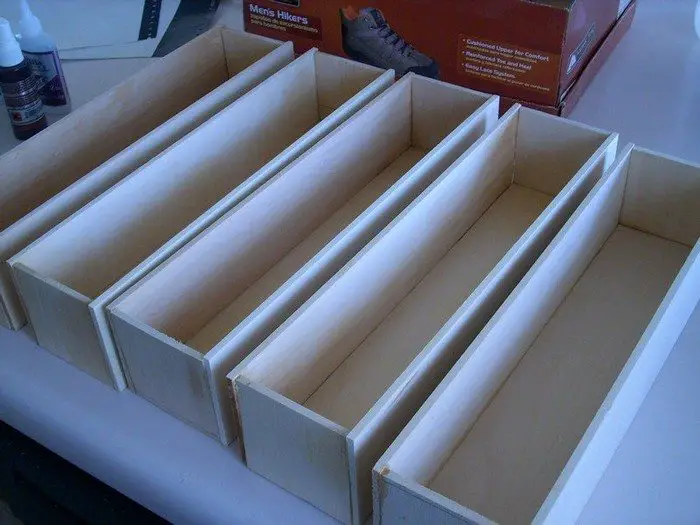
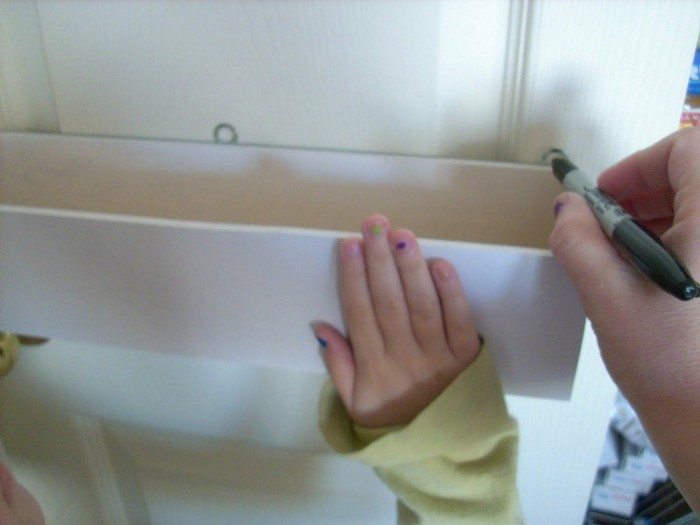
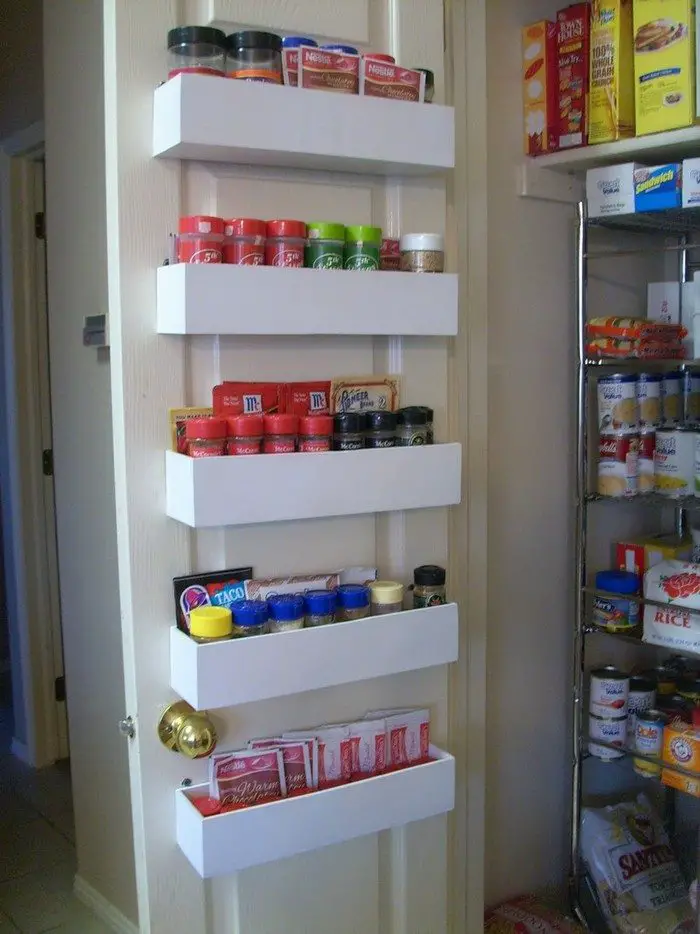
Under Cabinet Spice Rack
An under cabinet spice rack takes advantage of the often-underutilized space beneath upper kitchen cabinets. This built-in spice rack is designed to blend seamlessly with your kitchen cabinetry, providing a discreet yet highly functional storage solution.
It keeps spices within easy reach while cooking and can be custom-designed to fit the specific dimensions of your kitchen. This type of spice rack often features a slide-out or fold-down mechanism, making it easy to access your spices without cluttering your countertops.
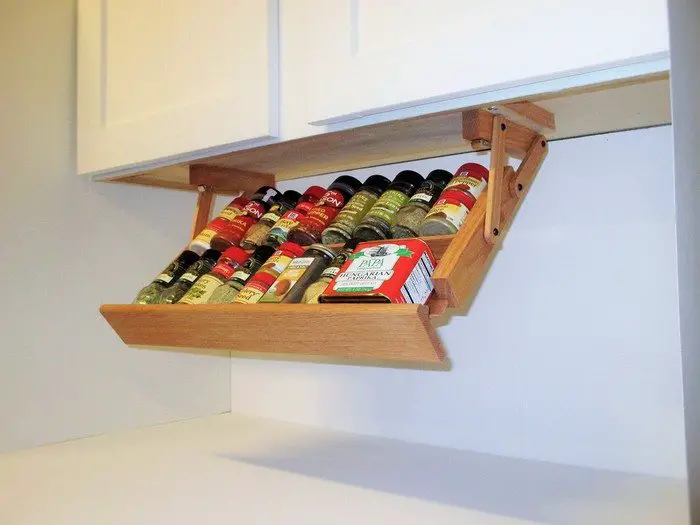
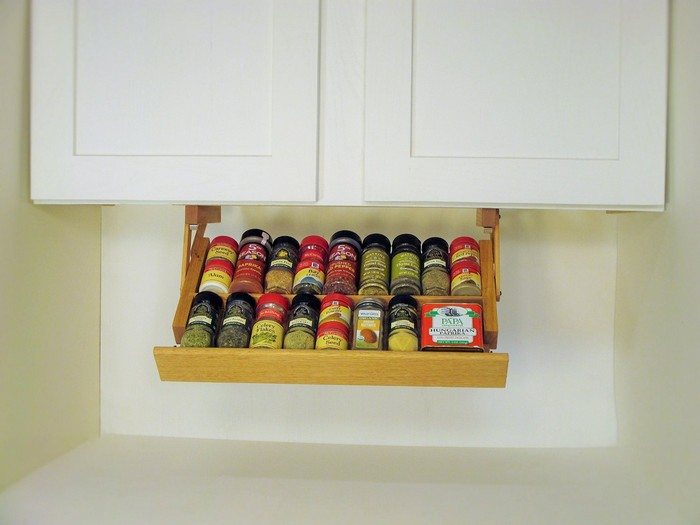
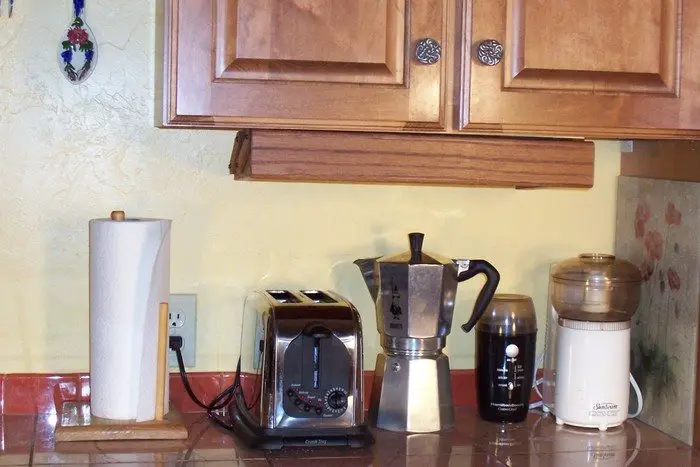
Consider a built-in test tube spice rack for a modern and stylish twist on the traditional spice rack. This innovative design uses test tubes to store spices, mounted on a wall or inside a cabinet door with custom-made holders.
The clear tubes not only display the vibrant colors of your spices but also add a touch of scientific chic to your kitchen decor. This built-in spice rack idea is perfect for those who appreciate a minimalist aesthetic and want to make a statement with their kitchen storage solutions.
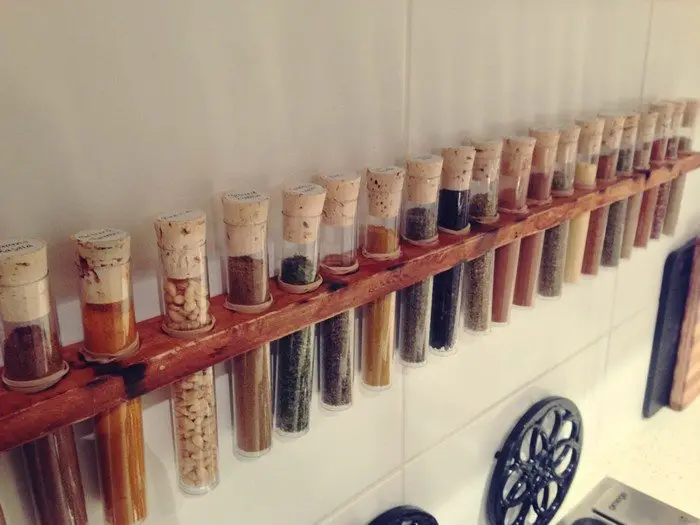

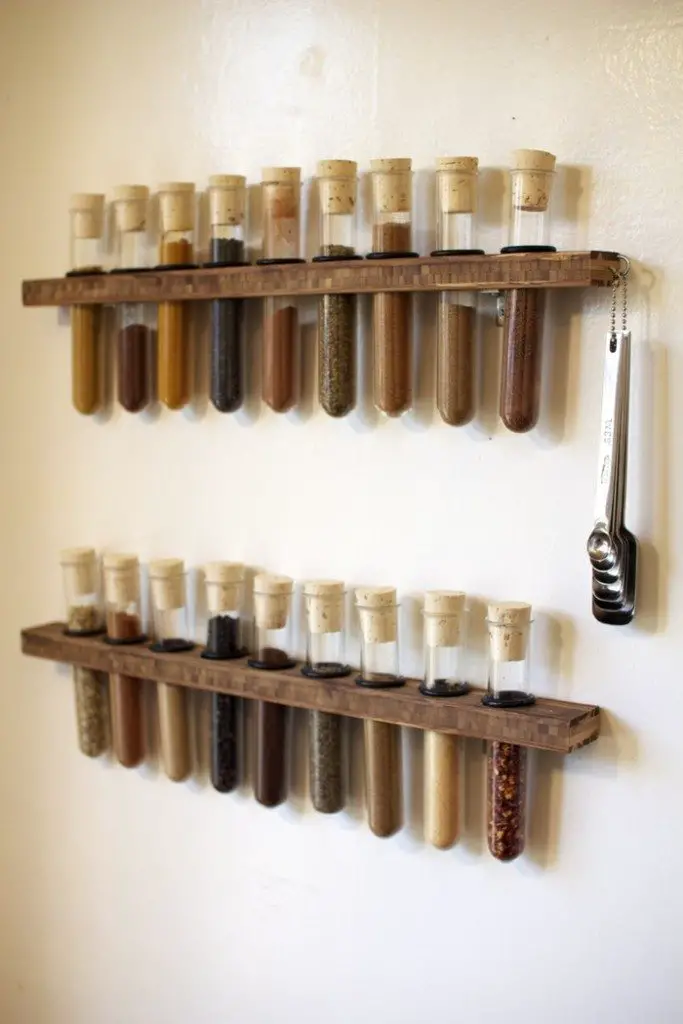
Cabinet Door Spice Clips
Utilize the inside of your cabinet doors by installing spice clips as a built-in spice rack solution. These clips are designed to securely hold spice bottles, allowing you to easily view and access your spices without taking up valuable shelf space.
This idea is particularly effective in small kitchens where maximizing every inch of storage space is crucial. By transforming your cabinet doors into a built-in spice rack, you create an organized and efficient way to store your spices, keeping them hidden away yet conveniently within reach.

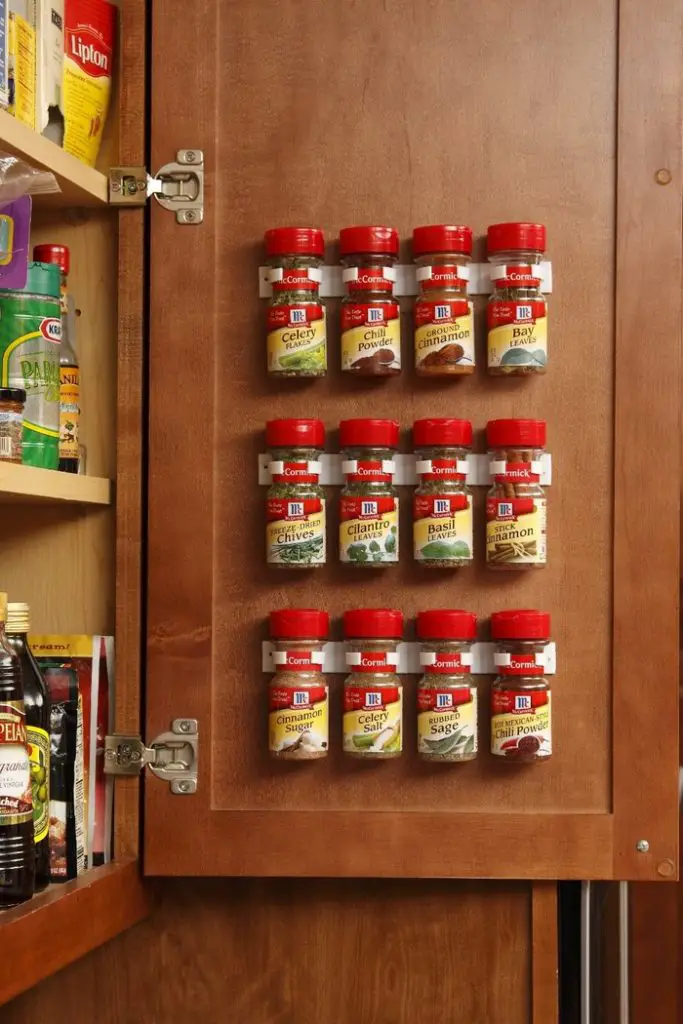
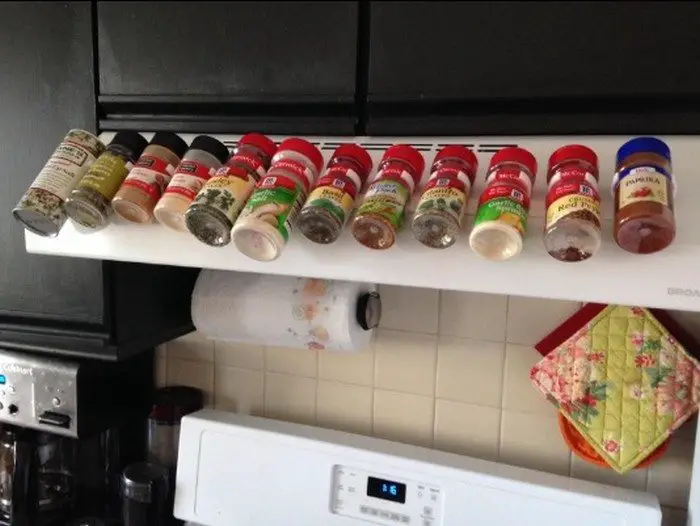
Spice Organizer
A built-in spice organizer can take many forms, but its primary purpose is to keep your spices neatly arranged within drawers or cabinets. Customizable dividers or tiered shelves allow you to sort your spices by type, usage, or alphabetically, ensuring they are always easy to find.
Integrating a spice organizer into your kitchen design as a built-in feature helps maintain a clutter-free environment and adds to the overall functionality of your cooking space.
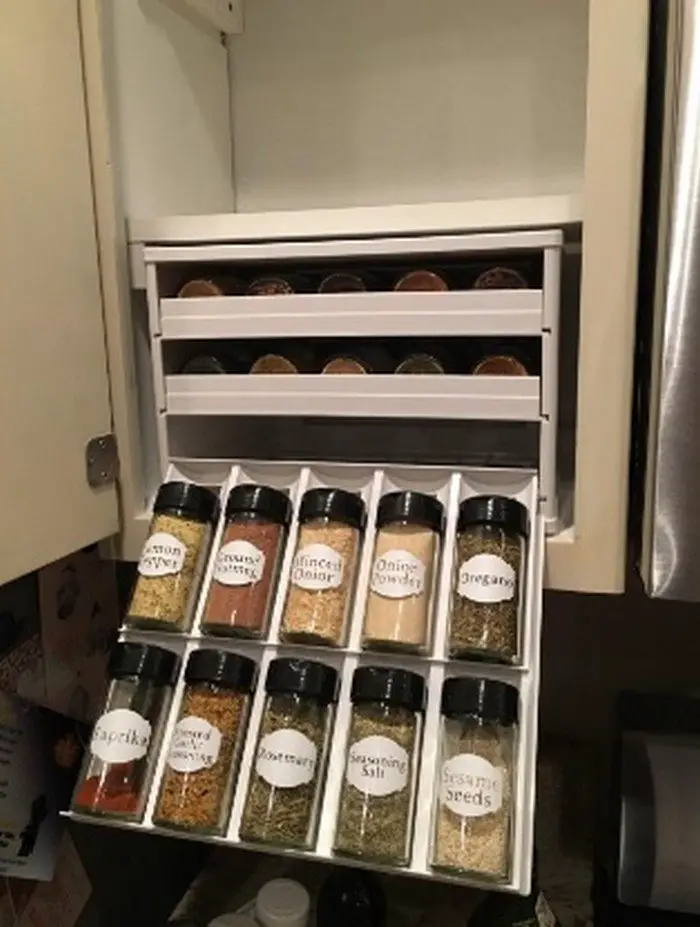
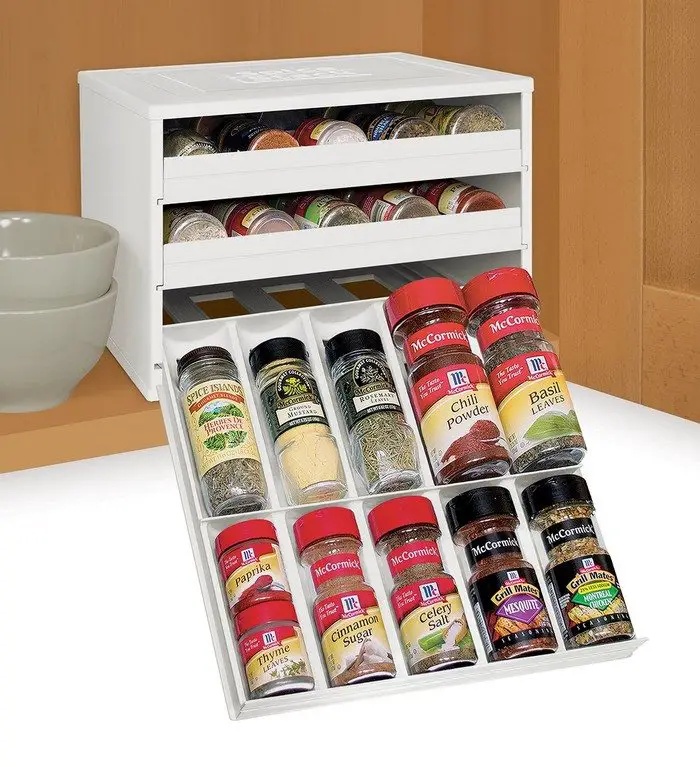
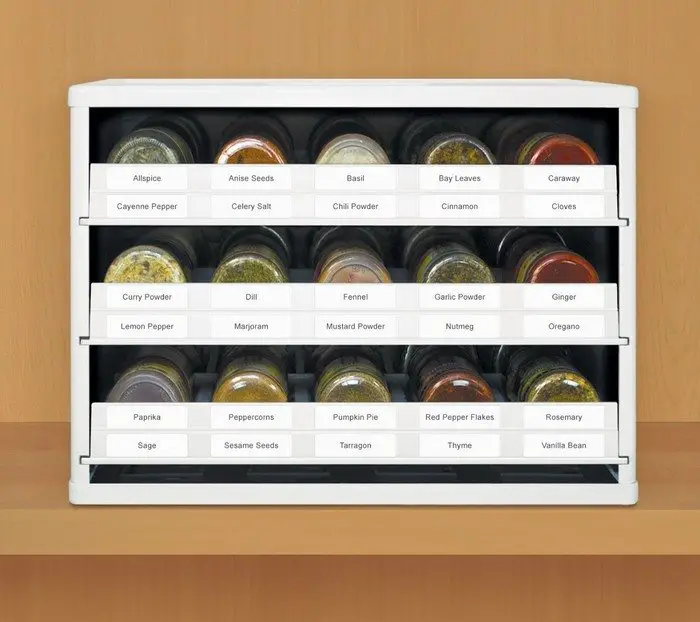
A pull-down spice rack is an innovative built-in solution designed for upper cabinets. This type of rack is mounted on the inside of a cabinet and can be pulled down at an angle, bringing the spices to eye level for easy viewing and selection.
It is especially beneficial for those with limited mobility or in kitchens where space is at a premium. The pull-down mechanism makes it effortless to access your spices without the need for stepping stools or rearranging items in your cabinets, enhancing both the usability and organization of your kitchen.
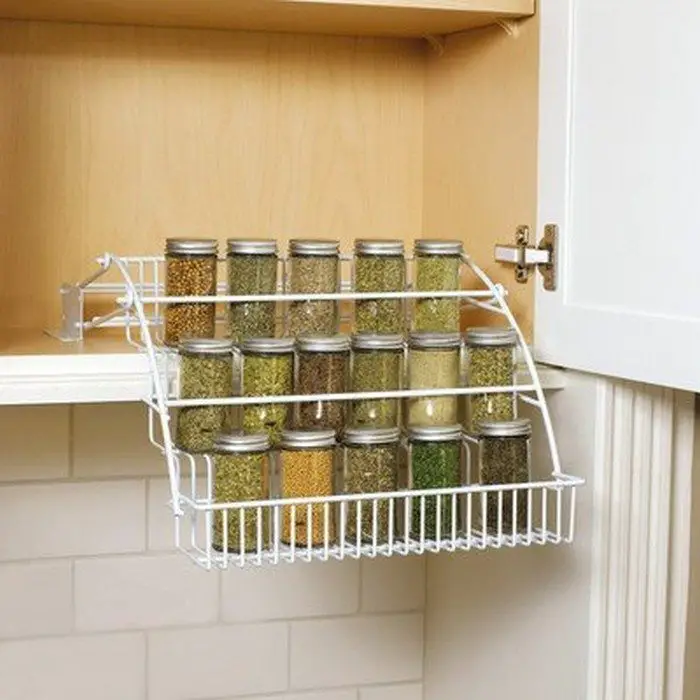
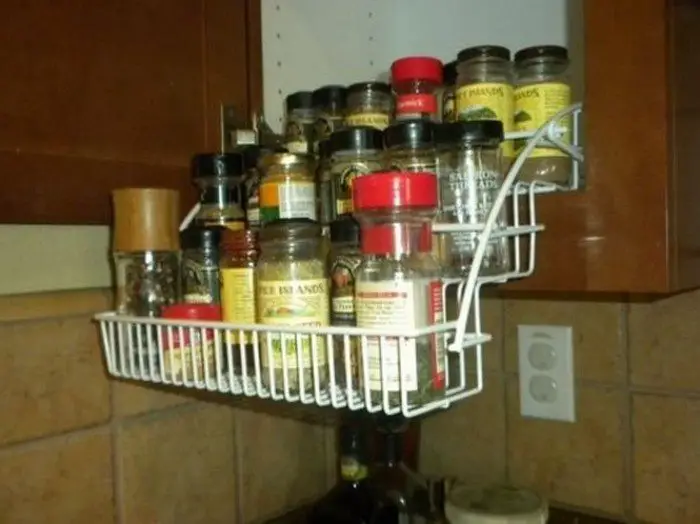
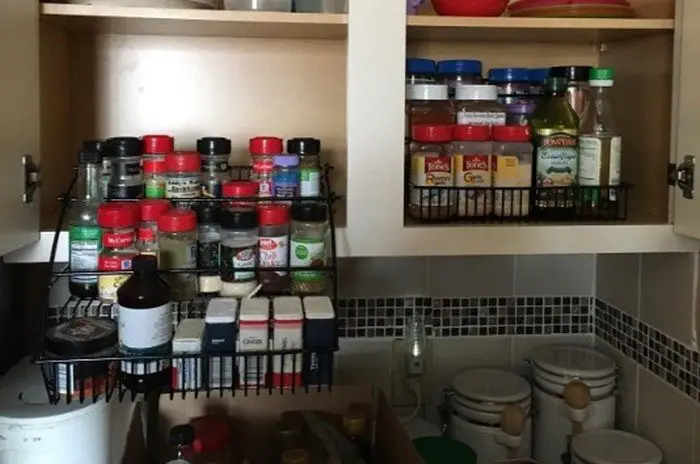
Maximizing Small Kitchen Spaces
Small kitchens present unique challenges when it comes to organization and storage. However, with some creativity and strategic planning, you can transform your cramped kitchen into a highly efficient and stylish space. One effective way to achieve this is by incorporating built-in spice racks and other smart storage solutions.
These ideas save valuable counter and cabinet space and add a custom touch to your kitchen.
Use Vertical Space Wisely
- Built-In Spice Racks: Maximize your kitchen’s vertical space by installing built-in spice racks on unused wall areas or the sides of cabinets. This not only keeps your spices organized and within reach but also frees up precious cabinet space for other essentials.
- Hanging Storage: Utilize the space above your counter by installing hanging storage solutions, such as pots and pans racks. This keeps your cookware handy while saving cabinet space for other items.
Optimize Cabinet and Drawer Space
- Sliding Cabinet Organizers: Equip your cabinets with sliding organizers to make it easier to access pots, pans, and small appliances without having to dig through cluttered shelves.
- Drawer Dividers: Use drawer dividers to neatly organize utensils, cutlery, and smaller kitchen gadgets. This helps maximize drawer space and keeps everything within easy reach.
Embrace Multi-Functional Furniture
- Foldable Kitchen Table: A foldable table can serve as an additional prep area when needed and be tucked away when not in use, offering flexibility in a small kitchen.
- Bar Cart: A bar cart can double as extra storage for kitchen essentials and a mobile serving station, making it a versatile addition to small spaces.
Invest in Wall-Mounted Appliances
- Wall-Mounted Microwave and Oven: Installing your microwave and oven within your cabinetry or mounted on the wall can save significant counter space, making your kitchen appear larger and more open.
Implement Underutilized Areas
- Under Cabinet Spice Rack: An under cabinet built-in spice rack utilizes the often-overlooked space beneath your upper cabinets, providing a hidden yet accessible area for your spices.
- Toe-Kick Drawers: The space beneath your lower cabinets can be converted into toe-kick drawers, offering additional storage for flat items like baking sheets and cutting boards.
Integrating these strategies lets you maximise every inch of your small kitchen. Built-in spice racks and other innovative storage solutions enhance your space’s functionality and create a more organized and aesthetically pleasing kitchen environment.
Spice Rack Maintenance and Organization Tips
Keeping your spice rack organized and well-maintained is crucial for any kitchen, allowing for easy access and optimal freshness of your spices. Built-in spice racks, in particular, offer a seamless and efficient way to store your seasonings, but like any storage solution, they require some upkeep.
Follow these tips to ensure your built-in spice rack remains both functional and beautiful.
Regular Cleaning
- Keep It Clean: Regularly cleaning your built-in spice rack helps maintain its appearance and functionality. Wipe down the shelves with a damp cloth to remove dust and spice residue. For wooden racks, use a wood cleaner to preserve the finish.
- Deep Cleaning Schedule: Set a schedule for a deep clean of your built-in spice rack at least twice a year. This involves removing all the spices, vacuuming any debris from the shelves, and cleaning each nook and cranny with a suitable cleaner. For sticky residue, a solution of warm water and mild dish soap works well.
- Protective Liners: Consider using washable, non-adhesive shelf liners on your built-in spice rack. These liners can catch spills and dust, making cleanup easier. They can be easily removed, washed, and replaced, keeping the rack cleaner over time.
- Natural Cleaning Solutions: For a more natural cleaning approach, use a mixture of vinegar and water to wipe down the spice rack. This solution is effective for cleaning without leaving harmful residues, ensuring your spices remain uncontaminated.
Spice Organization
- Categorize Your Spices: Organize your spices in a way that makes sense for your cooking habits. You might categorize them by usage (baking vs. cooking), by cuisine, or alphabetically. This system will make it easier to find what you need quickly.
- Use Uniform Containers: Switching to uniform spice containers gives your built-in spice rack a cohesive look and makes it easier to organize and identify your spices. Label each container clearly with the spice name and expiration date.
- Digital Inventory Tracking: Leverage technology to keep track of your spices by using a spreadsheet or a kitchen inventory app. This digital record can help you quickly see what you have, what’s running low, or what’s expired without manually sorting through every bottle.
- Color Coding System: Implement a color-coding system for your spice containers. Use different colored labels or caps to denote categories, such as herbs, baking spices, hot spices, etc. This visual system can speed up your cooking process by making grabbing what you need at a glance easier.
- Adjustable Shelf Heights: If possible, adjust the shelf heights in your built-in spice rack to accommodate various container sizes. This flexibility allows you to maximize the space and accommodate bulkier items without wasting space or overcrowding the shelves.
- Use of Clear Containers: If not already mentioned, transitioning to clear spice containers can significantly enhance organization. Clear containers allow you to see the contents and quantity at a glance, eliminating the need to open each one to check what’s inside or how much remains.
Maximizing Freshness
- Check Expiration Dates: Regularly check the expiration dates of your spices and discard any that are past their prime. Fresh spices make a significant difference in cooking, and keeping them up-to-date ensures your dishes are always flavorful.
- Store Spices Properly: Ensure your built-in spice rack is located away from heat sources and direct sunlight, as these can degrade the quality of your spices. A cool, dark place is ideal for preserving their flavor and longevity.
- Airtight Containers: Ensure all spices are stored in airtight containers to prevent exposure to air, which can degrade quality and flavor. Airtight containers also protect spices from moisture and pests, extending their shelf life.
- Buy in Small Quantities: Opt to purchase spices in small quantities that you can use quickly. This approach ensures that spices retain their potency and flavor, contributing to better-tasting dishes.
- Use Silica Gel Packets: Consider placing a silica gel packet in your spice containers to absorb any excess moisture. This tip is particularly useful in humid climates where moisture can cause clumping or spoilage.
Making the Most of Your Space
- Rotate Frequently Used Spices: Keep the spices you use most often at the front of your built-in spice rack for easy access. Rotate less frequently used spices to the back but ensure they are still reachable when needed.
- Incorporate Expandable or Sliding Shelves: If your built-in spice rack allows, incorporate expandable or sliding shelves to maximize space and accessibility. This feature is particularly useful for deep cabinets where spices can get lost in the back.
- Vertical Spice Racks: If you haven’t already utilized vertical spaces, consider adding additional tiers to your built-in spice rack. Vertical racks can dramatically increase storage capacity without expanding the footprint.
- Magnetic Spice Containers: Use magnetic spice containers for metal surfaces or add a magnetic spice rack inside cabinet doors. These can stick directly to the surface, freeing up shelf space in your built-in rack for other items.
- Utilize Door Space: If your built-in spice rack is part of a cabinet, make the most of the cabinet door by adding shallow shelves or clips for additional spice storage. This effectively doubles your storage area without impeding the functionality of the rack.
Regular Inventory
- Conduct Regular Spice Audits: Every few months, take inventory of your spices. This helps you keep track of what you have and prevents overbuying or duplication. It’s an excellent opportunity to wipe down the rack and reorganize, if necessary.
- Seasonal Check-ups: Align spice rack audits with seasonal changes, a natural time for kitchen turnover. This routine helps ensure that your spice collection is fresh and relevant for seasonal cooking.
- Spice Borrowing Log: Keep a borrowing log near the rack if you share spices with roommates or family members. This simple tracking method ensures everyone knows what’s been used and what needs replacing, keeping the inventory up-to-date.
- Labeling with Purchase Dates: Beyond expiration dates, label spices with their purchase dates. This information can help you prioritize using older spices first and assess how quickly you use certain spices to adjust future purchases.
By implementing these maintenance and organization tips, your built-in spice rack will serve as a functional and aesthetically pleasing part of your kitchen. Regular upkeep ensures the longevity of your spices and enhances your cooking experience, making meal preparation easier and more enjoyable.

